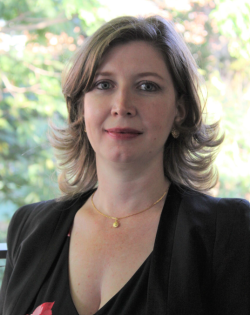
Catalina Pineda Molina
Appointment Rank: Core-Resident
Catalina Pineda Molina, BME, MSc, PhD
Catalina Pineda Molina is a Research Assistant Professor in the Department of Surgery, working with Dr. George Hussey and Dr. Stephen Badylak at the McGowan Institute for Regenerative Medicine at the University of Pittsburgh. Prior to joining the University of Pittsburgh, she was an Assistant Professor and Head of the Biomedical Engineering Program at Universidad CES, in Medellín, Colombia.
Catalina has a bachelor degree in biomedical engineering and a master’s degree in Biotechnology. In 2014 she received a Fulbright Scholarship and a Tuition Remission Fellowship from the Center for Latin American Studies at the University of Pittsburgh to pursue her PhD in Bioengineering under the advice of Dr. Stephen F. Badylak. Her doctoral work was focused on characterizing the host innate immune response and the molecular mechanisms associated with antimicrobial peptide production in macrophages induced by the implantable polymer composed by poly-4-hydroxybutyrate. In 2018, she was recognized with the TERMIS-AM Mary Ann Liebert, Inc. Outstanding Student Award. Prior to being a faculty member, Catalina was a Postdoctoral Associate in the laboratory of Dr. Stephen F. Badylak.
Catalina Pineda Molina´s research interests are focused on tissue engineering and regenerative medicine applications, particularly developing and evaluating naturally derived biomaterials for the promotion of appropriate constructive tissue remodeling. In particular, she is interested understanding the molecular mechanisms associated to host-biomaterial interactions and how these can be modulated through molecular bioactive markers, thus advancing in biomaterials science and the immunobiology associated to biomaterials. Catalina’s work has contributed to the development, optimization, and application of in vitro¸ in vivo, and ex vivo models for characterizing and evaluating biomedical products and treatments. Additionally, she has experience in leading and managing research and innovation projects in translational medicine, bridging together academia, the medical community, and industry.
